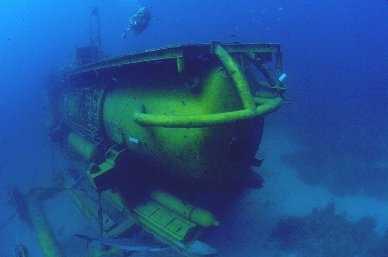Offshore engineering
Part of the Wikiversity Department of Marine Engineering, School of Engineering and the Engineering and Technology Portal

Aquarius on Conch Reef, off the Florida Keys
Content summary
Offshore Engineering applies ocean engineering studies to the engineering of devices within the benthic environment, such as Marine Foundations, Mooring Systems, Ocean Mining, Offshore Disposal, Offshore Pipelines and Cables, Offshore Structures, Submersible Vehicles, Submarine Habitats and Salvage Operations.
Goals
To further knowledge of the deep ocean as an engineering environment and to enable the practitioner to effectively design within the parameters of such.
Learning Materials
Texts
- Introduction to Oceanography; Wikibooks, the open-content textbooks collection
- Marine Hydrodynamics; Wikibooks, the open-content textbooks collection
Offshore Engineering Lessons
- The Benthic Environment
- Temperature
- Density
- Salinity
- Chemistry
- Deep Water Engineering
- Anchors
- Mining & Oil Exploration
- Biological Investigation
- Ocean engineering design
- Models & Scaling
- Resistance
- Propulsion
- Corrosion
- Galvanic Protection
- Arctic Engineering
Assignments
Activities:
Readings:
- Physical Properties of the Oceans
- Peruse the appropriate sections of b:Introduction to Oceanography
Study guide:
- Physical Properties of the Oceans
- Wikipedia article:Temperature
- Wikipedia article:Density
- Wikipedia article:Salinity
- Wikipedia article:Chemistry
- Wikipedia article:Marine geology
- Wikipedia article:Oceanography
- Wikipedia article:Chemical oceanography
- Wikipedia article:Physical oceanography
References
Additional helpful readings include:
- Elements of Ocean Engineering; Randall, Robert E., 1997, SNAME New York
- Principles of Naval Architecture (2nd Rev.); Lewis, E.V., 1989, SNAME New York
- Water Wave Mechanics for Engineers & Scientists; R.G. Dean, 1991, World Scientific Singapore
- Descriptive Physical Oceanography; G.L. Pickard, 1990, Butterworth Heinemann Oxford
Active participants
Please sign up!! Active participants in this Learning Group
- ...
This article is issued from Wikiversity - version of the Friday, December 11, 2009. The text is available under the Creative Commons Attribution/Share Alike but additional terms may apply for the media files.